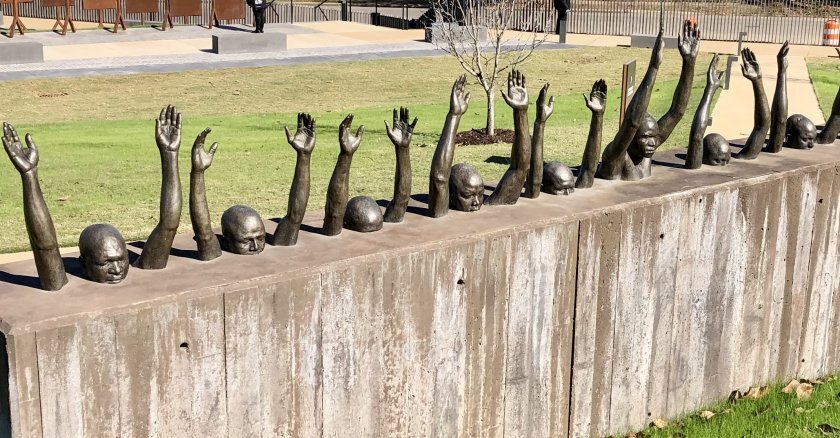The movement in opposition to what they refer to derisively as “wokism” and CRT has two political objectives: First, by playing the race card of wokism, they give conservatives a way to fire up their base among whites without having to talk about their true and dubious records and failures, such as their refusal to expand Medicaid eligibility under Obamacare in Florida and 10 other states. Conservatives also don’t address the reasons why, amid at least 71 mass shootings so far this year, they refuse to pass common-sense gun reforms or provide working and middle-class families much-needed tax relief.
The other advantage of branding African American history as “lacking in academic value,” from the perspective of right-wing conservatives, is that it could demoralize and marginalize Blacks and other minorities and demotivate them from voting. Such slogans as “Take back our country” and “Make America great again” would acquire a new meaning if more Americans knew that it was the exploitation of slave labor that built our economy and that every ethnic group that has immigrated to the U.S. has contributed to America being what it is today. These perspectives are likely to be taught in African American studies classes.
Those of us with academic credentials in the field obviously know more about Black studies and CRT than all the governors whose states have banned the subjects or created an atmosphere of fear and confusion over them so that they can’t effectively be taught. And we also know not to go down a rabbit hole chasing the ridiculous media obsession with changes to the Advanced Placement course in African American studies that few students, Black or white, ever take.
What today’s students ought to be taught is that Black history didn’t begin when enslaved Africans reached the shores of America. Africans in their homelands made contributions to science, mathematics, writing and the concept of a single deity. African survivals in Black culture can be experienced today in music, dance, food, religion and concepts of community in many places, particularly in the rural South. The teachings of these facts and theories challenge the biased view that enslaved people brought nothing of value from Africa. They undermine the assumption that African Americans are, somehow, not entitled to the full American franchise, including voting rights and economic and social justice.
I learned a long time ago as a student of African American studies in my Ph.D. program that Blacks have consistently raised questions about freedom and democracy in America. The great abolitionist Frederick Douglass, for example, pointed out the hypocrisy of America as a slaveholding nation back in 1852 when he delivered an address on the subject of the 4th of July: “What, to the American slave, is your 4th of July? I answer: a day that reveals to him, more than all other days in the year, the gross injustice and cruelty to which he is the constant victim. To him, your celebration is a sham. …”
Over a century later, Martin Luther King Jr. declared in his 1963 “Letter from Birmingham Jail”: “Oppressed people cannot remain oppressed forever. The yearning for freedom eventually manifests itself, and that is what has happened to the American Negro. Something within has reminded him of his birthright of freedom, and something without has reminded him that it can be gained.” Black scholars say King’s celebrated open letter, widely published at the time it was written, would be forbidden from being taught today in states moving to ban books written by Blacks, important historical documents on Black history and the teaching of CRT.
It is clear to me that to ban such writings as Douglass’ speech and King’s letter, on the grounds that they are “divisive” and would make white students feel guilty, is to rob all students of vital history and knowledge of how the nation got to be what it is today. And it may say to a Black student that you’re not truly American — which is exactly what DeSantis and company intend to communicate.
What is happening calls for action by all Americans. To start, African American athletes should think twice about playing for public universities like Arkansas, Florida, Florida State and Oklahoma where bans are in effect. These schools would be noncompetitive without the many great minority athletes who play there and would lose millions in revenue from television advertising.
Americans also should stop spending tourist dollars in states that don’t respect teachers and educators to make informed decisions about what students need to learn to be fully educated. It makes no sense for Democrats, along with African Americans and other racial minorities who are the targets of these cultural wars, to keep spending money in states that promote them.
Finally, this attack on American education should face strong rebuke and pushback from all sectors of society, including the clergy and corporate titans. In Florida, there should be more corporations than Disney pushing back. In Alabama, Georgia and Texas — states that have passed restrictions but not total bans — the private sector should be saying loud and clear, “Not in our state.” Church, mosque and synagogue leaders should remind officials that, in the words usually attributed to the 19th-century poet and journalist William Cullen Bryant, “The truth crushed to the earth shall rise again.”
The voices of Douglass, King and Bryant must in the end reign louder than those of governors like DeSantis, Arkansas’ Sarah Huckabee Sanders and Georgia’s Brian Kemp lest we all be damned. Preserving our freedom to learn and our right to be truly educated are bedrock principles of democracy we all should be willing to fight for.
Governing's opinion columns reflect the views of their authors and not necessarily those of Governing's editors or management.
Related Content














